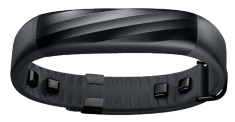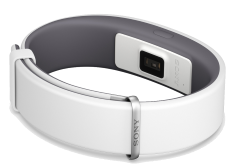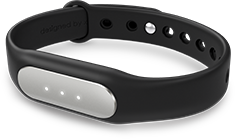All round health trackers for under £100
Do you want to track your general health? Me too, so I had a look around for some fitness trackers that might do the job – but when I reached 40 prospective devices I realised this was a bigger job than expected. The boom in health wearables at the moment seems to cover both ends of the market – from basic step counters to improving fitness with a personal trainer on your wrist. Some of these look fantastic but are out of most people’s budget.
So let’s focus on what features are really useful in a health tracker. And note that I’m saying health tracker as opposed to fitness tracker, as I want to monitor physical characteristics that might have real impact on my life expectancy.
Two important measurements to keep a close track on are blood pressure and weight, and although there are a couple of wrist BP monitors available they’re more aimed at people with a medical condition rather than as a convenient wearable, so I’ll continue doing that with separate equipment for now.
The three key physical properties I want to track are:
- inactivity
- sleep
- resting heart rate
Inactivity
There is more and more research highlighting that long periods of inactivity (for example at a desk or watching TV) cannot be compensated for with a few high intensity gym sessions. In one study of over 50s those with the lowest level of activity were 3 times more likely to die than those with average activity levels over an 8 year period.
For me this puts inactivity alerts as the number one feature required in a wearable health tracker. It’s no use reviewing your activity at the end of the week; I need a gentle nudge there and then to remind me if I’ve been sitting for too long.
Sleep
Another area of your life that has a definite impact on your life expectancy (and that you can control) is the amount of sleep you have each night. Most people know that too little sleep is bad for them, but too much is even worse. In a large meta-study it was found that people sleeping less than six hours a night were 12% more likely to die prematurely, however for those sleeping more than 9 hours a night there was a 30% increase.
Resting Heart Rate
The American Heart Association considers the resting heart rate as a good indicator of general fitness because a lower rate demonstrates that the heart muscle doesn’t have to strain to maintain a steady beat.
A normal resting heart rate (ideally measured before you get out of bed) is between 60 and 100 with professional athletes going down to 40 and below. Mine averages 59 (when taking my monthly blood pressure measurements) and it looks like you should be targeting the lower end of the 60-100 range, but if you’ve got a low heart rate and are having dizzy spells then best to see a doctor.
Almost all fitness trackers that include a heart rate monitor are using an optical sensor. These aren’t as accurate or responsive as chest straps that use electrical activity, especially when measuring heart rate during intense exercise, but for long term averages and morning resting rate they’re generally considered OK. Saying that, one of the products picked uses bioimpedance sensors so may be just as accurate as a chest strap, I’m not sure.
Product Comparison
With these 3 key tracking requirements, and a budget of £100 (about US$130), there were only 3 products from my long list that made the grade.
- Jawbone Up3 (£59)
- Sony SmartBand 2 (£79)
- Xiaomi Mi Band Pulse (£39)
Surprisingly none of the Fitbit range met the criteria as the Alta has inactivity alerts but no HR monitor and the Charge HR is the opposite. Be careful when reviewing the Charge HR – they hint at an inactivity alert but it’s only on the app for post-review, not built into the device itself.
| Product | Price | Temp (skin) | Battery Life | Display | Phone alerts | Water-poof | Weight (g) |
|---|---|---|---|---|---|---|---|
| Jawbone Up3 | £60 | Y | 7 days | 3 LEDs | N | Splash | 29 |
| Sony SmartBand 2 | £80 | N | 5 days | 3 LEDs | Y | 3m | 25 |
| Mi Band Pulse | £39 | N | 7 days | 3 LEDs | Y | Splash | 14 |
Jawbone Up3
https://jawbone.com/fitness-tracker/up3

The Up3 comes in 2 styles (twist and cross) and half a dozen different colours, but more importantly it come packed full of sensors.
Unlike pretty much all other activity trackers and smart watches, the Up3 uses bioimpedance sensors to measure heart rate. The sensors measure the resistance of skin tissue to tiny electric currents. For more technical information refer to their blog post: https://jawbone.com/blog/up3-advanced-multi-sensor-technology/
It says it tracks REM sleep – not sure how, I assume using an algorithm based on heart rate and movement – I’ll investigate this more when I get my hands on one (it’s on my xmas list!).
A feature I particularly like, and possible essential, is being able to configure the inactivity reminder – you can set the duration before receiving a vibration alert using the app and also set the time window when it monitors this. Makes sense, not sure how others do it when you’re sleeping.
Until I get to try one myself, here’s some feedback from the Wareable review (3.5 stars):
• comfortable fit, though clasp is fiddly as anything
• sensors leave imprints on your skin – but not uncomfortable
• app is one of the most comprehensive out there
• charging cable is badly designed
Read full review on Wareable: http://www.wareable.com/jawbone/jawbone-up3-review
Sony SmartBand 2
http://www.sonymobile.com/global-en/products/smart-products/smartband-2/

Available in 4 swappable colour silicone bands the SmartBand 2 looks as stylish as you’d expect from Sony. It lacks a few sensors included in the Jawbone Up3 however it does add vibration and LED alerts for phone notifications as well as basic media controls for pausing and skipping music.
The biggest complaint appearing in several reviews is the accuracy of the step tracking – with reviewers notching up steps when the phone isn’t being worn and over 1000 steps while sleeping.
An important note is that on the Sony website it claims 5 day battery life, but that is only in stamina mode with the heart rate sensor turned off, so I’ve put the more realistic 2 day battery life in the comparison table.
Key points from the Wareable review (3 stars):
- old school fitness band design
- smart alarm can wake you during light sleep once you've set certain parameters
- uses 2 apps – one for settings and on the spot readings, then the Lifelog app for activity graphs, milestones, etc
- battery life could be better
Read full review on Wareable: http://www.wareable.com/sony/smartband-2-review
Xiaomi Mi Band Pulse
http://xiaomi-mi.co.uk/xiaomi-mi-band/xiaomi-mi-band-pulse-black/

Not to be confused with Mio Global (who invented the optical heart rate sensor) the Mi Band Pulse is the budget option but retains most of the features offered by premium brands.
The heart rate monitor checks your pulse every 10 minutes, or on demand, and takes up to 30 seconds to take a reading so isn’t designed for fitness tracking at the gym, but should work fine for checking your resting heart rate first thing in the morning.
The Mi Fit app is also suitably budget, however it is compatible (with limited functionality) with both Google Fit and Apple Health.
The main reason I didn’t choose the Mi Band Pulse is the inactivity alert. Although it has one, it’s not configurable, so only reminds you have sitting still for an hour – I’d like to set mine to 30 minutes.
Key points from the Wareable review (3 stars):
- basic design
- breaks your walking and running into blocks of active time
- sleep tracking is hit and miss
- notifications for up to three apps
Read full review on Wareable: http://www.wareable.com/xiaomi/xiaomi-mi-band-pulse-1s-review
References
http://www.nhs.uk/chq/Pages/2024.aspx?CategoryID=52
http://www.heart.org/HEARTORG/Conditions/More/MyHeartandStrokeNews/All-About-Heart-Rate-Pulse_UCM_438850_Article.jsp#
http://www.nhs.uk/news/2010/05May/Pages/lifespan-link-to-sleeping-habits.aspx
Mentioned in this blog post:
Click on resource name for more details.
Topics mentioned on this page:
Fitness TrackerThey don’t want you to hear about the end of ageing
Review of longevity technology in Passengers (movie)




